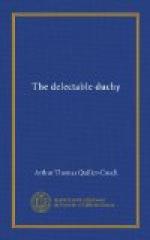“Not at all, my son. What makes ye deem it?” The little man tilted back his bronzed top-hat and looked up nervously.
“Because you went out in the middle of service.”
“’Tis but father’s habit, William,” old Mrs. Penberthy made haste to explain, laying a hand on his arm. She was somewhat stouter of build and louder of voice than her husband, but stood in just the same awe of her son. “He’s done it regular since he was appointed deacon.”
“Why?” asked William, stonily.
Uncle Penberthy pulled off his hat to extract a red handkerchief from its crown, removed his spectacles, and wiped them hurriedly.
“Them varmints of boys,” he stammered, “be so troublesome round the door—occasion’lly, that is.”
“Was that so to-night?”
“Why, no.”
“But you were absent at least twenty minutes—all through the silent prayer and half way through the third exhortation.” He gazed sternly at the amiable old man. “You didn’t hear me treat that difficulty in Colossians, two, twenty to twenty-three? If you have time, we’ll discuss it after private worship to-night. If I can make you see it in what I am sure is the right light, it will lead you to think more seriously of that glass of beer you have fallen into the habit of taking with your supper.”
It is but a fortnight since the Rev. William Penberthy came home; but in that fortnight his father and mother have aged ten years. The old man, when I took him my watch to regulate the other day—for on week-days he is a watch-maker—began to ask questions, as eagerly as a child, about the village news. It turned out that, for a whole week, he had not been down to sharpen his knife upon the bridge. He has given up his glass of beer, too, and altogether the zeal of his house is eating him up.
This morning the new minister climbed into the van with his carpet-bag. He is off to some Conference or other, and will be back again the day after to-morrow. Ten minutes after he had gone his father and mother shut up the shop and went out together. They mean to take a whole holiday and hear all the news. It was pitiful to see their fumbling haste as they helped one another to put up the shutters; and almost more pitiful to mark, as they hurried down the street arm in arm, their conscientious but feeble endeavour to look something more staid than a couple of children just out of school.
TWO MONUMENTS.
MY DEAR YOUNG LADY,—
Our postman here does not deliver parcels until the afternoon—which nobody grumbles at, because of his infirmity and his long and useful career. The manuscript, therefore, of your novel, Sunshine and Shadow, has not yet reached me. But your letter—in which, you beg me to send an opinion upon the work, with some advice upon your chances of success in literature—I found on my breakfast-table, as well as the photograph which you desire (perhaps wisely) to face the title-page. I trust you will forgive the slight stain in the lower left-hand corner of the portrait, which I return: for it is the strawberry-season here, and in course of my reflections I had the misfortune to let the cardboard slip between my fingers and fall across the edge of the plate.




